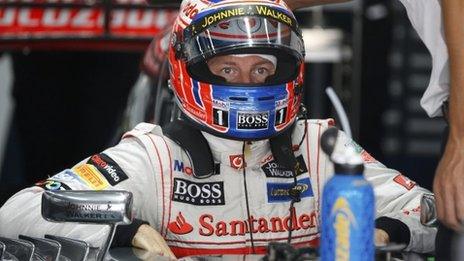Nigel Mansell: F1 weight limits for 2014 'disgraceful'
- Published
Weight limits disgraceful - Mansell
Former world champion Nigel Mansell says proposed weight limits in Formula 1 are "disgraceful" and "discrimination against the medium-sized large driver".
Next year's minimum weight limit has been increased to take into account the introduction of new engines.
But the engines are turning out to be heavier than expected, meaning taller - therefore heavier - drivers will be at a disadvantage.
"It's wrong. They [the drivers] are not jockeys," says Mansell.
The weight limit for the driver and the car this season is set at 642kg but with new, heavier 1.6-litre V6 turbo engines and energy recovery systems being introduced in 2014, the minimum weight has been raised to 690kg.
However, much of the extra 48kg is expected to be taken up by the new power units, leaving less leeway for the weight of the drivers.
Every kilogram a driver adds will matter, with 1kg of weight equating to about 0.035secs a lap on an average circuit.
Consequently, a driver like Fernando Alonso, who weighs 68kg, will have an advantage over Sauber's Nico Hulkenberg, who weighs 74kg.
Mansell added: "It's disgraceful, it's discrimination against the medium-sized large driver.
"In years gone by, we didn't have traction control or power steering - you had to be a strong driver and there were a lot of strong drivers. If you had this weight limit, they wouldn't have been able to drive cars many years ago - or they would have driven with great difficulty.
"So I think get the weight limit up a bit, make some cars carry some ballast so that the bigger drivers don't suffer as much. "
McLaren's Jenson Button, who weighs 74kg, has already expressed concern, saying ahead of the Korean Grand Prix: "I'm 74-75kg with my kit and I struggle to meet the weight limit. I have done for three years.
"I love fitness training but there are things I can't do because I have to be a set weight - not eat carbohydrates, not build muscle. And next year it will be worse. I don't think any team will have ballast next year."
- Published8 October 2013

- Published4 October 2013

- Published26 February 2019
